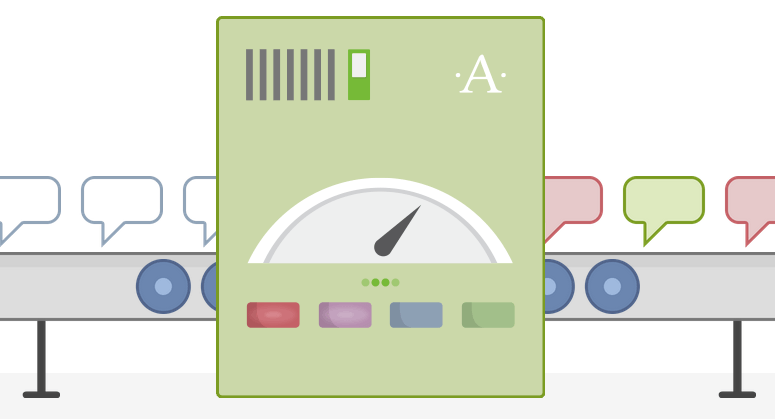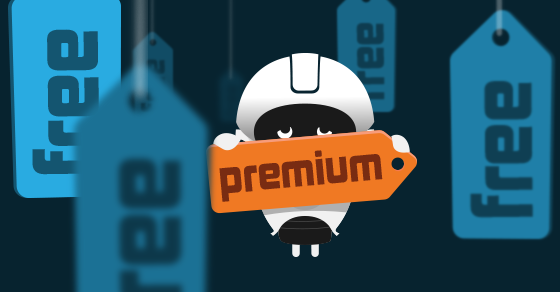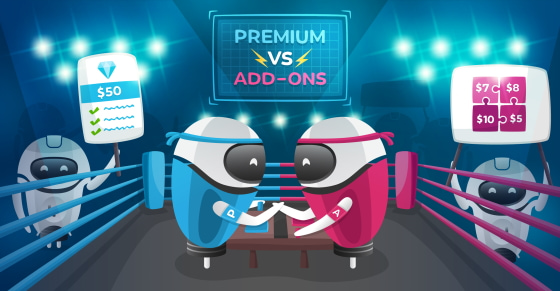|
|
Deciding which features should be free or premium can be a daunting task as a plugin developer.
You’ll need to continually monitor the mix of free and premium functionality you’re providing, constantly looking for that perfect balance between attracting new users and offering the right incentives to purchase.
Getting the mix right is worth it though. A quick look at Scott Bolinger’s 2015 WordPress Revenue Statistics report shows freemium offerings such as Ultimate Member pulling in a tidy $20,000+ per month.
In this article, we’ll focus on how best to select premium plugin features. We’ll also throw in insights from some of the best-known developers in the business that came up during a recent WP Chat discussion we started on the topic.
Before we begin though, let’s quickly review the merits of free functionality.
The Value of Free
Let’s be honest here, this is the real trick: provide enough value in the free version to get attention and users, then have an equally (if not more) valuable set of features in your premium product.
– Robby McCullough, developer of Beaver Builder
A solid foundation of free features makes it all the easier to sell people on the value of premium functionality. Free features perform the following useful roles:
- Capturing market share: As a plugin maker, your main initial problem is discovery rather than people copying your ideas. Offering free functionality is a wonderful way of gaining early exposure and makes marketing outreach considerably simpler down the line.
- Gaining user trust: Once you’ve got those free users in the door, the daily performance of your free functionality starts proving your overall reliability and quality of work. Consider it a calling card. Once that trust is established, making an upsell is going to be substantially easier.
- Identifying new opportunities: Free features give you an active, and in many cases vocal, user base. Interrogating the needs of these existing free users is likely to open up many ideas for future premium features.
Selecting Premium Features
The world can be divided into two classes of people: those who are happy to pay for quality goods and services, and those who actively resent doing so. Obviously, you are after the former group.
1. Is This Feature Unique?
Does a feature solve a unique problem or do it in a way that is measurably different from the competition? Is this an advantage you’d feel comfortable defending in the market?
If the answers to those questions are yes, you have a candidate for a premium feature.

Let’s take our own RatingWidget plugin as an example. RatingWidget is the only WordPress ratings plugin that provides a real user reputation-based rating for bbPress.
This enables a user rating to be based on aggregation of all the user’s interactions – forum replies, comments, and so on. If you’re running a forum and want to provide really accurate reputational user rating, you’re pretty much obliged to go for RatingWidget. It’s a unique feature that more than justifies the outlay.
2. Does This Feature Save Users’ Time?
A significant proportion of your potential audience will be comprised of freelancers or small to medium-sized businesses. These are people with a vested interest in time management.
If a particular feature of your plugin increases productivity or saves time, you’re in a position to make a strong argument that it justifies the expense involved.

Akismet is a great example of this in action. Spam is as big an issue as ever these days, particularly for popular blogs with a lot of traffic. Adding a spam filter can save a site owner several hours every week at the very minimum.
Any commercial site owner should be more than happy to pay the incredibly affordable prices involved in outsourcing most of this problem in order to reclaim some of their valuable time.
3. Does This Feature Make Users Money?
This is closely allied to question two as time, more often than not, equates to money. If a feature of your plugin gives users the opportunity to charge more, offer wider functionality to their own customers or improves business processes, you should feel free to take a value-based pricing approach.
What I try to do is think about the features. Does this feature have the potential to make the purchaser money? If so, it goes into the pro version. Does it save them a significant amount of time? It also goes into the pro version if so.
– Rhys Wynne, developer of WP Email Capture

Popup Maker is an excellent example of this. It features a premium extension called Exit Intent Popup which claims to be able to help users capture up to 700% more leads. That’s the type of potential sales funnel boost that people will be more than happy to pay for.
Conclusion
Getting the mix of free and premium features right is one of the most important decisions you’ll make when developing and marketing your plugin. Both have their uses of course. Use free features to do the following:
- Capture market share.
- Gain user trust.
- Identify new revenue opportunities.
Then bring home the bacon by using the following questions to identify premium features:
- Is this feature unique?
- Does this feature save users time?
- Does this feature make users money?
We’d love to hear how you tackle the free/premium split. Are there strategies or tactics that have worked particularly well for you? Let us know in the comments!



![The Freemium Business Model In The WordPress Ecosystem [+Video] – A Tool For Increasing Sales?](https://freemius.com/blog/wp-content/uploads/2018/10/freemium-business-model-wordpress-featured-image.jpg)




Great write up! Thanks for using my quote, too! :)
Thanks Robby!
I am paying for time saving and money making plugins. My clients are paying for time saving and money making plugins. I think that those are the top features.
As a freemium plugin developer, I find these articles very helpful. Deciding what should be free vs premium is a real challenge. This site definitely helps. Thank you.
This is exactly why Freemius is probably the only blog worth reading if you are a developer looking to fine tune your business. I am a massive fan! I did my first ever freemium plugin thanks to tips from the blog and I am so happy I took the plunge! I wish I could move all my premium plugins to Freemius, but have no clue about what will happen to the existing customer licenses that I have on my WooCommerce based plugin shops.
Thanks for the kind words, Mohsin. Feel free to reach out to us via [support AT freemius DOT com] and we would be happy to evaluate if a transition to Freemius would make sense for your business and what would be the best way to handle it.
Thanks for the reply Vova. I have sent over an email, looking forward to your reply.